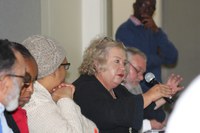The right to adequate housing in SA still a challenge
This roundtable provided an opportunity for academics, community based organisations, non-governmental organisations, policy makers and stakeholders to discuss the political dimensions of the constitutional requirement that government “meaningfully engage” with citizens and interested civil society groups affected by social policy changes.
The event was moderated by Dullah Omar Institute’s Prof Ebenezer Durojaye and speakers were as follows:
Toni Van Niekerk, the director of City of Cape Town’s TDA Business Enablement unit made a presentation on community profiling as a basis for effective delivery of essential services in communities in Cape Town. She explained that information generated as result of the profiling of communities will assist the City in planning and providing the essential services that meet the need of the people. She noted that TDA Business Enablement plays a key transversal role in equipping and enabling the TDA Authority to achieve its objective of being a highly effective authority that is well governed, fact based, well governed, performance-driven and absolutely customer-centric.
Van Niekerk’s presentation was followed by Makale Ngwenya of the Studies in Poverty and Inequality Institute (SPII). Her presentation looked at indicators for monitoring the right to adequate housing in South Africa. This presentation was part of the SPII Working Paper 15 which is a part of a larger research project that is undertaken by SPII in partnership with the South African Human Rights Commission. The aim of the project is to develop a comprehensive monitoring tool to measure and guide the progressive realisation of Socio-Economic Rights enshrined in the South African Constitution. So far about 25 indicators have been developed to monitor the realisation of the right to adequate housing in South Africa
The roundtable closed with Ndifuna Ukwazi’s Julian Snedin, who looked at the Reclaim the City Campaign. The campaign focuses on desegregation and affordable housing development in the inner city. Launched on 13 February 2016, the campaign consists of an active chapter of domestic workers and low-income earners in Sea Point, supporters among poor tenants in Woodstock and Salt River, young professionals, high school pupils, students and workers from across Cape Town. At the end of the meeting, participants agreed that there was need for continued interactions among different stakeholders to ensure the realisation of the right to adequate housing in South Africa.

